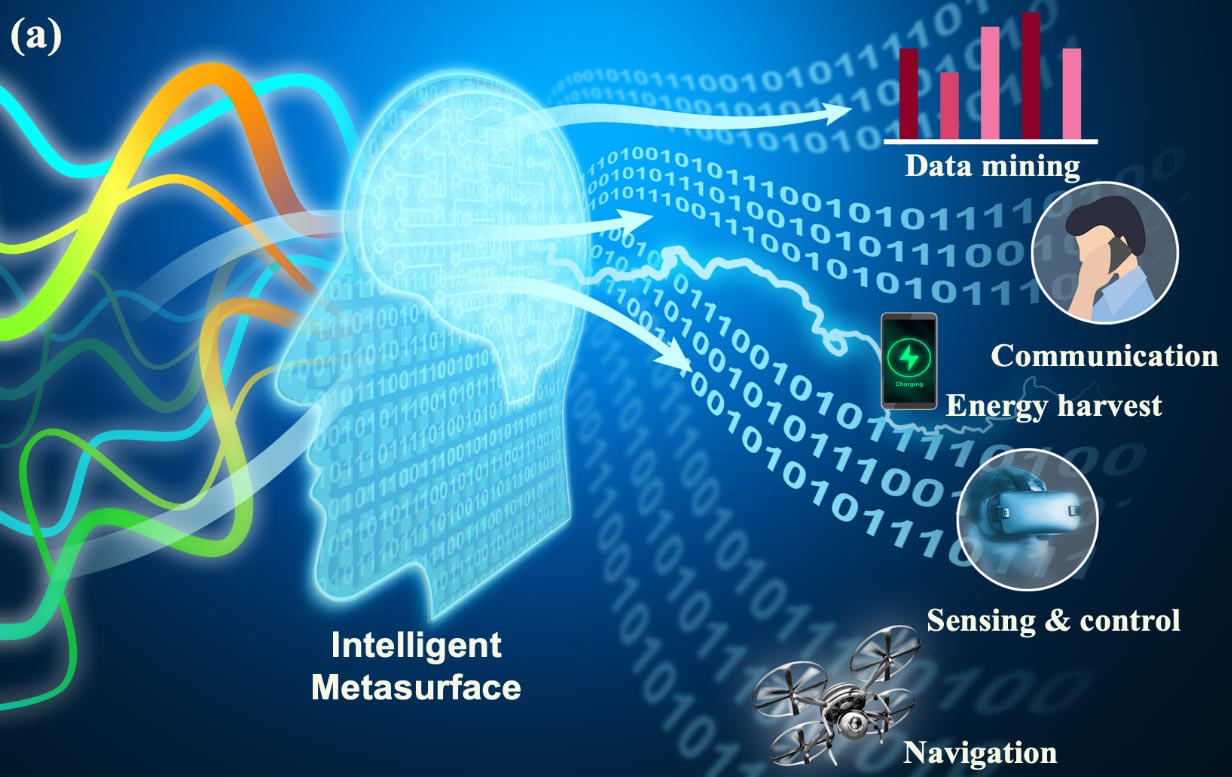

The intelligent metasurface, AI-empowered artificial material, is a smart platform enabling various functions such as data mining, communication, energy harvest, and sensing by directly processing illuminated information-carrying waves on the physical level. Credit: Lianlin Li, Hanting Zhao, Che Liu, Long Li, and Tie Jun Cui
The manipulation of electromagnetic waves and information has become an important part of our everyday lives. Intelligent metasurfaces have emerged as smart platforms for automating the control of wave-information-matter interactions without manual intervention. They evolved from engineered composite materials, including metamaterials and metasurfaces. As a society, we have seen significant progress in the development of metamaterials and metasurfaces of various forms and properties.
In a paper published in the journal eLight on May 6, 2022, Professor Tie Jun Cui of Southeast University and Professor Lianlin Li of Peking University led a research team to review intelligent metasurfaces. “Intelligent metasurfaces: Control, Communication and Computing” investigated the development of intelligent metasurfaces with an eye for the future.
This field has refreshed human insights into many fundamental laws. They have unlocked many novel devices and systems, like cloaking, tunneling, and holograms. Conventional structure-alone or passive metasurfaces has moved towards intelligent metasurfaces by integrating algorithms and nonlinear materials (or active devices).
Intelligent metasurfaces have three crucial properties: digitalization, programmability, and intelligence. They provide an important opportunity to control the interactions without human intervention. Digitalization enables the metasurface to encode, decode and store digital information. Programmability means that the metasurface can realize distinct functions with one physical entity. Intelligence indicates that the intelligent metasurface can make decisions, self-program, and perform successive tasks without human supervision.
Intelligence is the core, and algorithms can take this role well. Artificial intelligence (AI) has developed rapidly, particularly in data mining and knowledge discovery. Deep learning has proven extraordinarily useful in nearly every field of science and engineering. Deep learning has significantly positively impacted the metamaterials and metasurfaces field. It will undisputedly give birth to comprehensive and active research directions.
In assessing the future of intelligent metasurfaces, the wireless signals that already exist in our lives could be vital to the field’s further development. The development of 6G wireless communications, green IoT, and digital twinning is where intelligent metasurfaces could benefit.
We can envision that intelligent metasurfaces can learn, make decisions, self-programming, and continuously learn throughout their ‘lifetime.’ The intelligent metasurface is an emerging research direction involving various disciplines. There are a lot of open questions needed to be carefully addressed in the future.
Reference: “Intelligent metasurfaces: control, communication and computing” by Lianlin Li, Hanting Zhao, Che Liu, Long Li and Tie Jun Cui, 6 May 2022, eLight.
DOI: 10.1186/s43593-022-00013-3